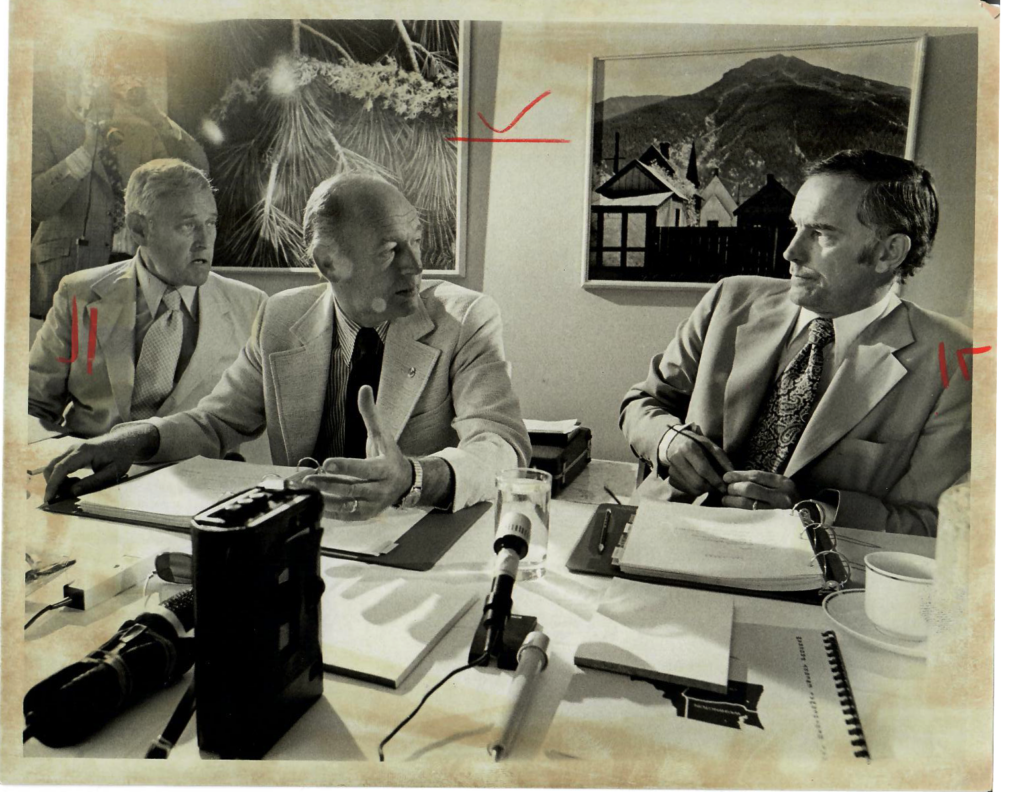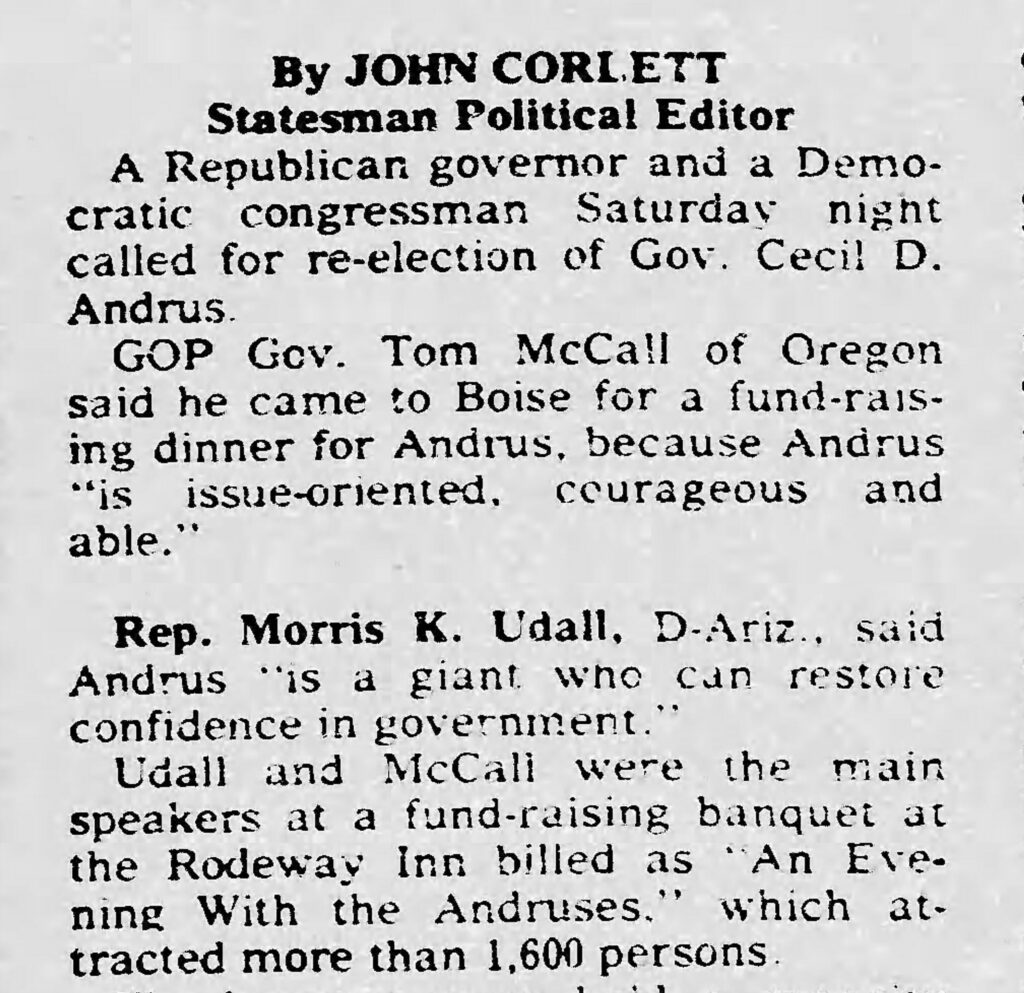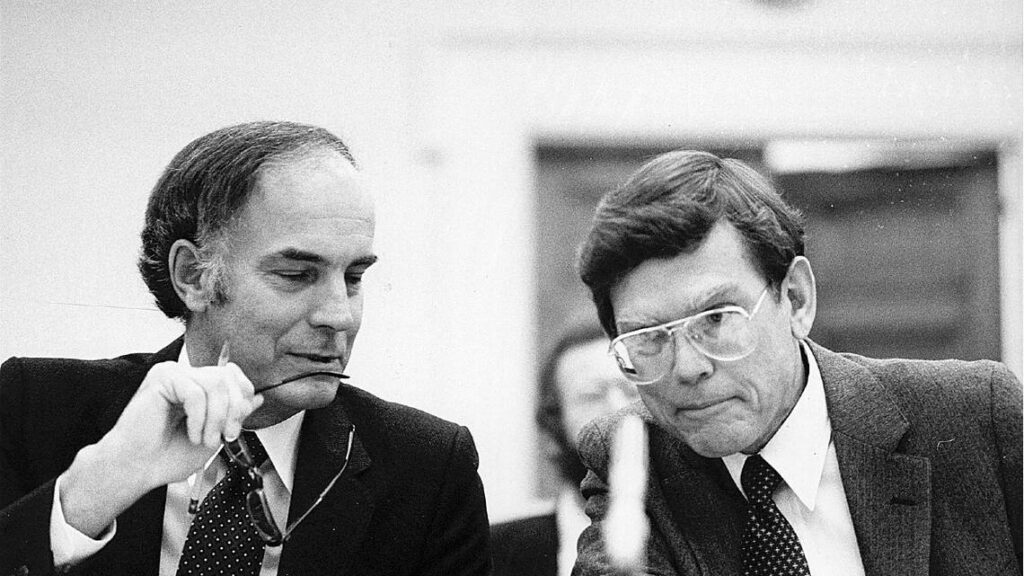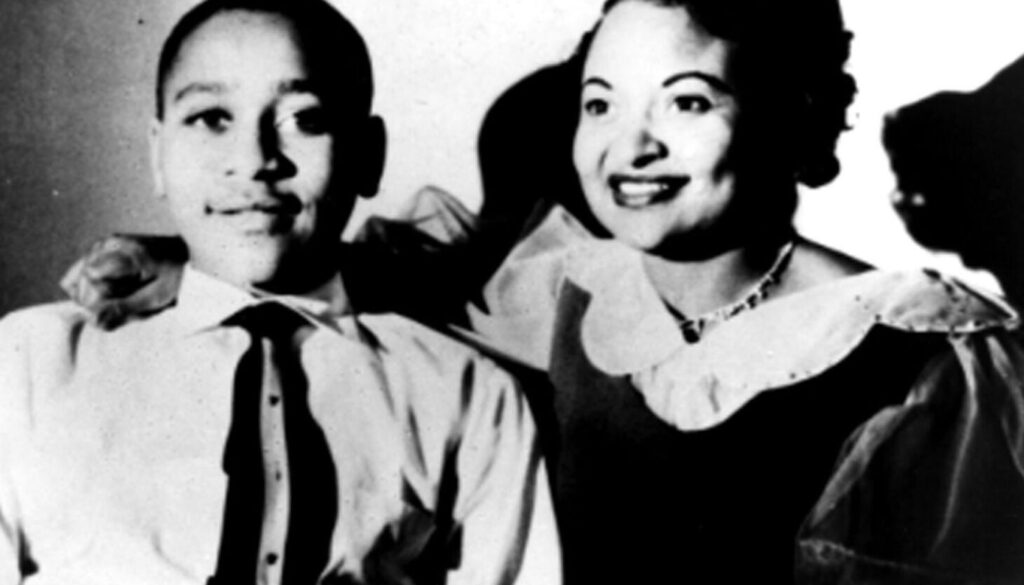In the early 1970’s voters across the Pacific Northwest – Idaho, Oregon and Washington – could boast, and often did, that the region was home to three of the most accomplished, most interesting and most engaging governors in the country.
Cecil Andrus in Idaho, Tom McCall in Oregon and Dan Evans in Washington – the self-described three amigos – formed a political and personal partnership that hasn’t come close to being replicated in the intervening 50 years.

Ironically, the most conservative Northwest state, Idaho, elected Andrus, a Democrat, in 1970 – the first of his four terms – while the more liberal coastal states elected two progressive Republicans. Washington voters put Evans in the Statehouse in 1964 for the first of three terms, while Oregonians gave McCall the first of his two terms in 1966.
Andrus and Evans defeated incumbents to win the governorship, while McCall defeated a popular Oregon secretary of state. Each man became a vote gathering machine, often defying their own national parties and in the process developed legacies unmatched in the region.
All three were pioneering state-level conservationists. McCall’s landmark efforts to preserve public access to Oregon’s magnificent beaches continues to mean to this day that the public interest in the state’s shoreline is paramount. McCall, like Andrus and Evans, believed not every tree had to be cut or mountainside despoiled in the name of economic progress.
The gruff McCall famously told a television interviewer that Oregon was a special place, too special to be ruined by too much development and too many people. “Come visit us again and again,” McCall said. “This is a state of excitement. But for heaven’s sake, don’t come here to live.”
Andrus’s four terms were the bookends for his history making tenure as Secretary of the Interior, a time that saw Jimmy Carter, with encouragement and strategy by Andrus, champion protections of millions of acres of wilderness, wildlife refuges and national parks in the nation’s last frontier, Alaska.
All three governors championed public and higher education and wise economic development. McCall and Andrus were early champions of land use planning. And each man understood the wisdom of joining forces on issues of regional importance, putting aside partisan considerations to give the region greater clout and more ability to attract national attention and money.
Their mutual regard extended so far that Republican McCall came to Boise in 1974 to headline a fundraiser for Idaho’s Democratic governor. When Evans was appointed and then elected to the U.S. Senate after the death of legendary Washington senator Henry “Scoop” Jackson, Andrus endorsed Evans as the only man big enough to fill Jackson’s shoes. When Andrus made his gubernatorial comeback in 1986, Evans endorsed his Democratic friend with such conviction that the Andrus campaign turned the endorsement into an incredibly effective political ad.

McCall, a terrific writer whose early journalism career included a job at what is now the Moscow-Pullman Daily News, was the first of the amigos to go, dying of cancer in 1983. McCall was a one-of-a-kind character, brash, outspoken, clever with a quip and determined to make change.
As McCall’s biographer Brett Walth has written, “McCall dominated everything around him … because of all he represented in his state.”
Andrus was a similar personality. Quick with a quip and just as quick, as he often said, to “throw an instant fit” when he encountered unfairness or ineptitude. Andrus dominated the politics of his conservative state through three decades because he was the genuine article – tough, empathic, a strategic thinker determined to make a difference while keeping the trust of voters who just plain liked “Cece.”
Andrus’s death in 2017 left only the last amigo, Dan Evans. And now that towering figure has died at 98.
Evans, who demanded in the 1960’s that the hard right wing of his own party, including the John Birch Society, just leave the Republican Party is the last of a breed: the determined individualist, willing to buck party and ideology in the cause of genuine progress.

Long-time Washington journalist Joel Connelly wrote of Evans: “He was a lifelong Republican, part of a now critically endangered species of conservation-minded members of the Grand Old Party. Nowadays, the annual Conservative Political Action Conference has panels debunking Theodore Roosevelt.”
The legacy of the three amigos will not diminish. You’ll continue to see it in the Andrus White Clouds wilderness in central Idaho, the Alpine Lakes in Washington and a dozen other places championed for protection by Evans and the waterfront park in Portland that carries Tom McCall’s name.
It requires courage and vision and action to make our fractured politics work. The get-along, go-along types can win elections by catering to the worst instincts in their party and appealing to the lowest common denominator in the electorate, but in the end these types merely occupy a place on the ballot or hold down a desk. They do little or nothing for democracy and the next generation.
It’s tempting to say that we’ll not soon – or perhaps ever – see the like of Evans, McCall and Andrus again. And ask yourself why?
The answer won’t be found in partisan politics or fealty to a corrupt leader or even the obvious desire for popularity that too often requires trimming and hedging. Leadership of the type Andrus, Evans and McCall demonstrated was all about character – the moral and ethical qualities of any individual.
Scandal never touched any of these men. They kept their word to their voters. They stood for real and important things like clean air and water and the thrill of wide open spaces where humans are but temporary visitors. They built schools, spoke candidly about challenges, demanded excellence of themselves. They behaved honorably.
The Pacific Northwest once had three amigos and we are better, much better for having had them.
—-0—-
Some additional reading:
For your consideration …
The Polling Imperilment
Political historian Rick Perlstein dissects what is wrong with the polling industrial complex and concludes, well, pretty much everything.
“W. Joseph Campbell’s Lost in a Gallup: Polling Failure in U.S. Presidential Elections demonstrates—for the first time, strangely enough, given the robust persuasiveness of its conclusions—that presidential polls are almost always wrong, consistently, in deeply patterned ways.”
A Rule for the Ages, or a Rule for Trump?
A scathing take down of the Supreme Court’s recent immunity ruling.
Trevor W. Morrison, a dean emeritus of the New York University law school, writes: “A majority of the Court has now embraced a rule that may make it impossible to prosecute any future president for any official act, no matter how egregious. That is a drastic holding, fundamentally changing the place of the president in our system of laws.”
Can this possibly be what the Founders intended? Link here.
The Truth About Emmett Till Wasn’t in Your History Book
I don’t have any sense any longer about how many Americans are even vaguely familiar with the Emmett Till story, the brutal murder of a Black teenager in Mississippi in 1955.

This piece from Politico is very hard to read, but you should read it.
“The most proximate cause of Emmett Till’s murder was the political system of Mississippi. Ruled by the pledge to keep Black citizens locked in a caste system, it was as guilty for what happened to Emmett Till as the brothers who beat and shot him to death. Seeing that history whole is an essential reminder, a warning to all Americans as we approach our own fraught election, a lesson unlearned about the danger of reckless speech, how the hysteria of language on the stump inevitably becomes violence in the streets.”
From the author of a new book on these sad and horrifying events.
This Defeated Presidential Candidate, Once the ‘Best-Known Man in America,’ Died in a Sanatorium Less Than a Month After Losing the Election
“Newspaper editor Horace Greeley unsuccessfully ran against incumbent Ulysses S. Grant in November 1872. Twenty-four days later, he died of unknown causes at a private mental health facility.”
From Smithsonian Magazine.
Thanks for reading.
I’ve used this space many, many times over the last many months to try and create – in my own small way – a sense of urgency about the coming election. It is a frightening, anxious and, yes, even hopeful time, but Americans must take the election with grave seriousness. So much is at stake.
One party is offering a deeply troubled candidate, a convicted felon, a serial liar who instigated an insurrection in an attempt to stay in power.
The other party offers a candidate who was a former prosecutor, attorney general of the nation’s largest state, a United States senator and for the last four years the vice president of the United States. This candidate is broadly within the traditions of American politics, a serious, stable, experienced person.
You don’t need to like the policy positions of either candidate, but you simply must evaluate the character of each candidate. When you do, and strip away all the bluster, bombast, racism and hate the choice becomes crystal clear.
See you again soon.
